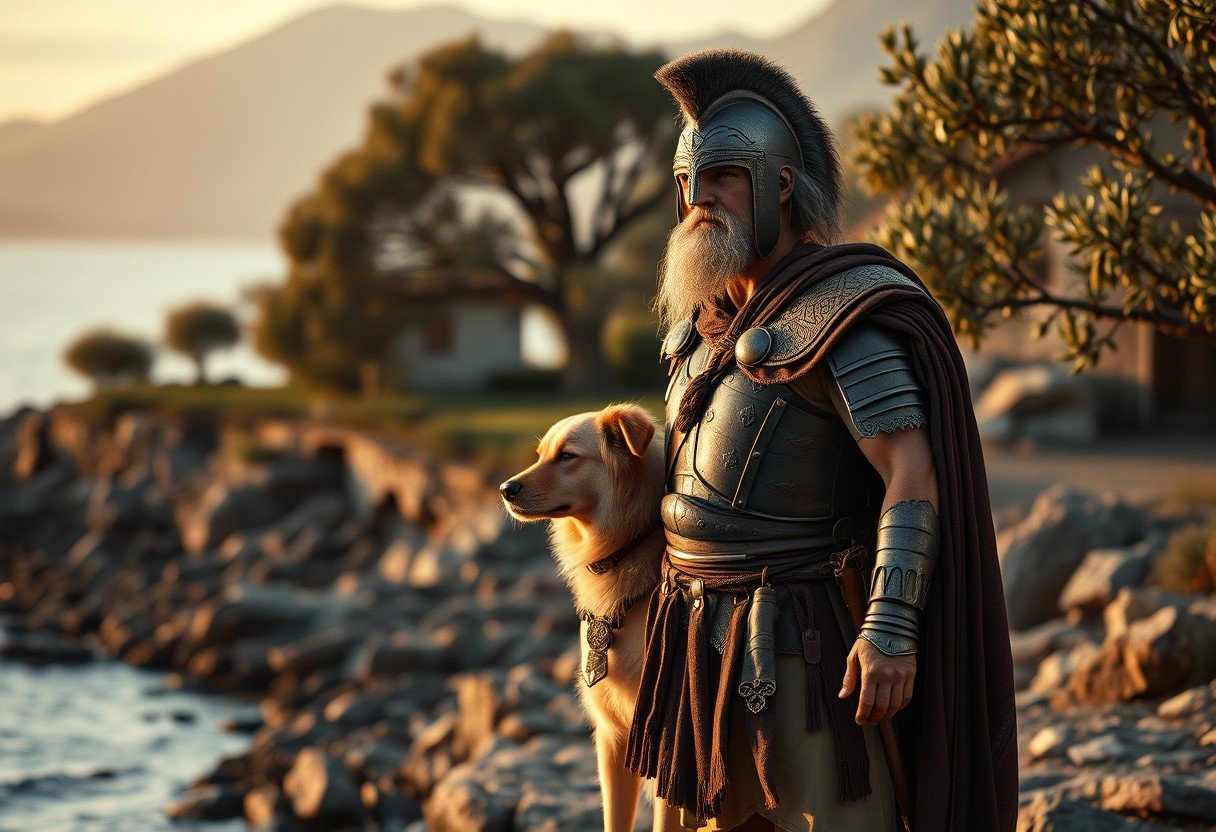Odysseus’s journey home after the Trojan War is a legendary tale that explores the core Greek values of family and perseverance. Set in ancient Greece, this epic reveals how Odysseus’s unbreakable bond with his family and his relentless determination guide him through years of hardship, shaping both his character and the very fabric of Greek cultural ideals.
The Foundation of Family in Greek Culture
Family stood at the center of Greek society, representing not only immediate relatives but also extended kin and community members. Ancient Greeks believed that the well-being of the household, or oikos, was essential for social stability and personal fulfillment. This sense of collective responsibility fostered deep emotional ties and a strong sense of identity among Greeks.
In myths and literature, family loyalty and kinship are frequently portrayed as forces that drive heroes to act with courage and honor. For Odysseus, home was not just a place but a symbol of love, duty, and legacy. His longing to return to Ithaca and reclaim his role as husband and father reflects these shared Greek values.
Key aspects of family in Greek culture include:
- Mutual support and protection among kin
- Transmission of values and traditions across generations
- A sense of belonging and personal identity rooted in family ties
Family was more than a social unit; it was the lens through which Greeks understood loyalty, honor, and even the divine.
Odysseus’s Unwavering Commitment to His Family
The heart of Odysseus’s long journey is his deep commitment to his wife, Penelope, and son, Telemachus. Throughout The Odyssey, his thoughts return to his family as he faces dangers and temptations far from home. This emotional bond becomes his main source of strength, helping him resist offers of immortality, comfort, and power that would separate him from those he loves.
Odysseus’s loyalty is especially evident in moments where he must choose between ease and the difficult road back to Ithaca. Despite years of separation, he never loses sight of his ultimate goal—reuniting with his family. His actions show that, for Greeks, the pull of home and kinship could outweigh even the lure of the gods or personal glory.
Odysseus also embodies the Greek ideal of nostos, or homecoming. This concept emphasizes the emotional and cultural importance of returning to one’s roots, restoring order, and fulfilling one’s responsibilities as a family member. In doing so, Odysseus not only reclaims his identity but also restores harmony to his household and community.
The Central Role of Perseverance in Odysseus’s Journey
Perseverance is woven deeply into the fabric of Odysseus’s character. Over ten years, he faces countless obstacles: monstrous creatures, treacherous seas, and the wrath of powerful gods. Each trial tests more than his strength—it challenges his willpower, patience, and hope.
Ancient Greek culture prized endurance and resilience as pathways to honor and greatness. Odysseus’s journey is a prime example, as he repeatedly overcomes adversity by relying on cleverness, adaptability, and an unyielding spirit. He learns from each setback, using both intellect and courage to move forward.
Some of the trials that highlight Odysseus’s perseverance include:
- Escaping from the Cyclops Polyphemus using wit and bravery
- Resisting the enchantments of Circe and the Sirens
- Surviving years as a captive on Calypso’s island, never giving up hope of returning home
Through all these challenges, Odysseus’s resolve serves as a model for Greeks, showing that perseverance is not only about survival but about achieving a meaningful goal—reuniting with family and restoring order.
The Interplay of Family and Perseverance
Odysseus’s journey is shaped by the constant interaction between his devotion to family and his ability to persevere. Neither value stands alone; instead, they reinforce each other at every turn. His family is the reason he endures, and his endurance is what eventually leads him back to them.
A closer look at their connection reveals:
| Family | Perseverance |
|---|---|
| Emotional anchor and motivation | Ability to overcome setbacks |
| Goal of reunion and restoration | Relentless pursuit of homecoming |
| Responsibility to protect loved ones | Maintaining hope and action despite adversity |
For example, when tempted by Calypso’s offer of immortality, Odysseus thinks of Penelope and Telemachus, refusing to give up his quest. His perseverance is always guided by his commitment to family, illustrating how these two Greek values are inseparable in his story and in the broader culture.
Odysseus’s Relationships with Penelope and Telemachus
At the heart of the epic are Odysseus’s relationships with his wife and son, which provide emotional depth and highlight the Greek ideals of loyalty, faith, and legacy. Penelope stands as a symbol of patience and fidelity, holding the household together despite relentless pressure from suitors and uncertainty about her husband’s fate.
Her cleverness and hope mirror Odysseus’s own qualities, showing that strength and endurance are not limited to the battlefield. Their reunion is both a personal and cultural victory, emphasizing the value Greeks placed on strong, faithful marriage bonds.
Odysseus’s relationship with Telemachus evolves as the story unfolds. At first separated by war and distance, father and son each grow through their struggles. Telemachus’s search for his father becomes a journey of self-discovery, mirroring Odysseus’s own challenges. When they finally reunite, their bond is stronger, symbolizing the transmission of values and the hope of renewal for the next generation.
The Influence of the Gods and Fate
Odysseus’s journey is not shaped by human effort alone. The will of the gods—especially Athena and Poseidon—plays a major role in his struggles and successes. For ancient Greeks, divine intervention was a fact of life, and fate was seen as both a challenge and a guide.
Athena, the goddess of wisdom, supports Odysseus because of his cleverness and devotion to family, helping him in his darkest moments. Poseidon, angered by Odysseus’s actions, creates obstacles that test his perseverance. These divine forces mirror the unpredictability of life and the belief that, while fate may set the stage, individual effort and values determine the outcome.
The interplay between fate and free will in Odysseus’s story reinforces the idea that perseverance and loyalty are not just personal virtues but universal truths, recognized and rewarded even by the gods.
The Symbolism and Impact of Odysseus’s Homecoming
When Odysseus finally returns to Ithaca, the event is more than a simple homecoming. It symbolizes the restoration of order, the triumph of hope, and the renewal of family bonds. His return ends years of turmoil, reestablishing his rightful place in the household and community.
This moment holds deep emotional and cultural significance for Greeks, who saw home as the heart of personal and social identity. The reunion with Penelope and Telemachus is a testament to the power of steadfast love and the resilience needed to overcome adversity.
Odysseus’s homecoming also serves as a model for others, demonstrating that true heroism lies in the ability to endure for the sake of family and community. The restoration of harmony in Ithaca reflects the broader Greek ideal that personal virtue and social order are intertwined, both sustained by the values of family and perseverance.
Lessons from Odysseus’s Journey for Modern Readers
The story of Odysseus continues to resonate today because its core values are timeless. Modern readers can draw inspiration from his unwavering commitment to family and his refusal to give up in the face of hardship. These lessons remain relevant for anyone facing challenges, reminding us that hope, resilience, and love are powerful tools for overcoming adversity.
Whether navigating personal struggles or seeking a sense of belonging, Odysseus’s tale encourages us to hold fast to our values. The importance of family, the need for perseverance, and the belief in eventual reunion can guide us through difficult times and help us find our way home—wherever that may be.
FAQ
How does Odysseus show his dedication to family throughout his journey?
Odysseus’s actions are consistently motivated by his desire to return home to Penelope and Telemachus. Despite temptations and hardships, he refuses offers that would separate him from his loved ones. His journey is a testimony to the power of familial love and loyalty in Greek culture.
What are the main obstacles that test Odysseus’s perseverance?
Odysseus faces challenges such as captivity on Calypso’s island, the wrath of Poseidon, encounters with the Cyclops, and the dangers of the Sirens and Scylla. Each obstacle tests his resourcefulness, patience, and determination to achieve his ultimate goal—returning home.
How do the gods influence Odysseus’s journey?
The gods play both supportive and adversarial roles. Athena aids Odysseus because of his cleverness and devotion, while Poseidon seeks to hinder him. These interactions reflect the ancient Greek belief in fate and divine influence, showing that human effort and values work in tandem with the will of the gods.
How does Penelope represent Greek family values?
Penelope embodies loyalty, patience, and cleverness. She maintains her household, fends off suitors, and never loses faith in Odysseus’s return. Her actions highlight the Greek ideal of enduring love and the importance of upholding family honor and unity.
What lessons can readers learn from Odysseus’s story?
Odysseus’s journey teaches the enduring importance of resilience and dedication to loved ones. His story encourages readers to persist through adversity, value family connections, and believe that perseverance and hope can lead to eventual reunion and restoration, no matter the odds.









Leave a Comment